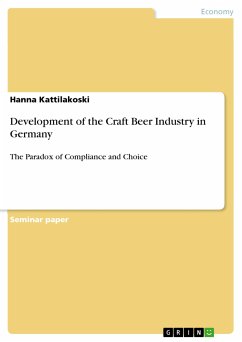Seminar paper from the year 2016 in the subject Business economics - Industrial Management, grade: 90.00, Cologne Business School Köln, course: Strategic Management, language: English, abstract: Beer has been an integral part of German culture for centuries, but the craft beer industry, a more recent market segment, has been evolving since the 1980s. This paper delves into the context of the craft beer industry in Germany, exploring the dimensions of industry development, the inhibitors affecting this development, and the intriguing paradox between compliance and choice. To comprehend the craft beer segment's position within the German beer market, it's essential to analyze industry development. Porter's five forces (competitors, buyers, suppliers, new entrants, substitutes) identify key players within the industry that require deeper examination. Industry development results from shifts in the underlying factors within the sector. This analysis offers insights into the future of the craft beer market. Industry development encompasses several categories, each with unique characteristics that signal potential shifts in the industry landscape. These dimensions will be further explored. In converging industries, companies become more alike, while divergence occurs when businesses introduce new models and differentiate themselves. The beer industry leans toward divergence, especially within the craft beer subsector. Craft beer is a product of this divergence, with brewers striving to offer unique experiences and flavors. Craft breweries focus on individuality and distinctive taste profiles, challenging the former homogeneity of beer. Craft beer can be divided into subcategories, such as microbreweries, brewpubs, contract brewing companies, and regional craft breweries. These segments showcase the industry's capacity for innovative business models, ensuring each craft brewer's uniqueness.
Dieser Download kann aus rechtlichen Gründen nur mit Rechnungsadresse in A, B, BG, CY, CZ, D, DK, EW, E, FIN, F, GR, HR, H, IRL, I, LT, L, LR, M, NL, PL, P, R, S, SLO, SK ausgeliefert werden.









